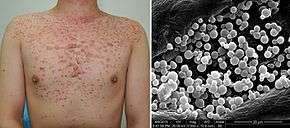Pityrosporum folliculitis

Pityrosporum folliculitis[2] or Malassezia folliculitis is a skin condition caused by infection by pityrosporum yeast.[3]:314
The skin of the upper trunk area including the back, chest, arms and sometimes the neck is often affected and this condition is often seen in young to middle aged adults, although it has been known to occur in adults well into their sixties, and can also be found on the lower extremities as well. Its diagnosis is based on the pruritic (itchy) papulopustules found in a follicular pattern in these regions.[4]
Although pustules form from an overgrowth of the yeast, Malessezia furfur, plugging the follicles. M furfur is lipophilic, requiring fatty acids like what is present in oily skin to proliferate. It has been shown that pityrosporum yeast grows by consuming fatty acids with carbon chain lengths C11 to C24.[5] Pityrosporum is part of the normal skin flora, but overgrows in certain conditions.[4] Overgrowth is associated with oily skin, humidity or other pre-existing dermatologic conditions such as seborrheic dermatitis and severe dandruff.[6]
See also
References
- ↑ Ran Yuping (2016). "Observation of Fungi, Bacteria, and Parasites in Clinical Skin Samples Using Scanning Electron Microscopy". In Janecek, Milos; Kral, Robert. Modern Electron Microscopy in Physical and Life Sciences. InTech. doi:10.5772/61850. ISBN 978-953-51-2252-4.
- ↑ Rapini, Ronald P.; Bolognia, Jean L.; Jorizzo, Joseph L. (2007). Dermatology: 2-Volume Set. St. Louis: Mosby. ISBN 1-4160-2999-0.
- ↑ James, William D.; Berger, Timothy G.; et al. (2006). Andrews' Diseases of the Skin: clinical Dermatology. Saunders Elsevier. ISBN 0-7216-2921-0.
- 1 2 Siobahn M Bower, MD; Daniel J Hogan, MD & Stephen H Mason, MD (December 21, 2009). "Malassezia (Pityrosporum) Folliculitis". eMedicine by WebMD. Retrieved January 30, 2009.
- ↑ Wilde, P. F.; Stewart, P. S. (December 1, 1968). "A study of the fatty acid metabolism of the yeast Pityrosporum ovale". Biochemical Journal. 108 (2): 225–231. PMC 1198797
 . PMID 5691082.
. PMID 5691082. - ↑ American Osteopathic College of Dermatology. "Dermatologic Disease Database: Pityrosporum Folliculitis". Retrieved January 30, 2009.